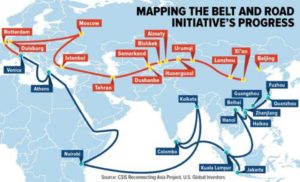 I am writing this from Brno, Czech Republic, where I have been attending a conference on intercultural communication. There are attendees from all over, but more from Asia than from Europe or North America. The theme of the conference is “East / West: New Divisions, New Connections and Populist Political Reality”. Many Western speakers (UK, USA, Europe) have highlighted (and bemoaned) the populist political atmosphere in many countries, which encourages suspicion of immigrants/foreigners and celebration of nationalist views. In the process, they often critique their national governments, especially the xenophobic rhetoric from Donald Trump’s White House. On the other hand, the Chinese colleagues (not those from Taiwan, Hong Kong, or Macau) have highlighted in their talks a Chinese government development which I have not connected with intercultural communication: the Chinese Belt and Road Initiative. The project involves Chinese companies working with local authorities on infrastructure projects. In the West, it has been controversial due to insensitivity to local cultural conditions and to debt-trap diplomacy.
I am writing this from Brno, Czech Republic, where I have been attending a conference on intercultural communication. There are attendees from all over, but more from Asia than from Europe or North America. The theme of the conference is “East / West: New Divisions, New Connections and Populist Political Reality”. Many Western speakers (UK, USA, Europe) have highlighted (and bemoaned) the populist political atmosphere in many countries, which encourages suspicion of immigrants/foreigners and celebration of nationalist views. In the process, they often critique their national governments, especially the xenophobic rhetoric from Donald Trump’s White House. On the other hand, the Chinese colleagues (not those from Taiwan, Hong Kong, or Macau) have highlighted in their talks a Chinese government development which I have not connected with intercultural communication: the Chinese Belt and Road Initiative. The project involves Chinese companies working with local authorities on infrastructure projects. In the West, it has been controversial due to insensitivity to local cultural conditions and to debt-trap diplomacy.
Another controversial issue that arouse at the conference was the social responsibility of teachers, especially university professors, to speak out publicly about issues that might be viewed as political such as social justice or income inequality. Some colleagues pointed out that in some countries doing so might lead to those speaking out losing their jobs, or even going to jail. Others pointed out that just because of that fact, those of us in countries where it is (relatively) safe to speak out should do so. From that perspective, it may be that for those working in the area of intercultural communication might think about adding to the traditional components of intercultural competence, i.e. skills, knowledge, attitude, a fourth element: action. That would translate into encouraging students to take action to promote intercultural communication, which could involve political engagement, such as working to elect leaders who support tolerance and diversity. If we have that expectation for our students, that translates into teachers doing the same.